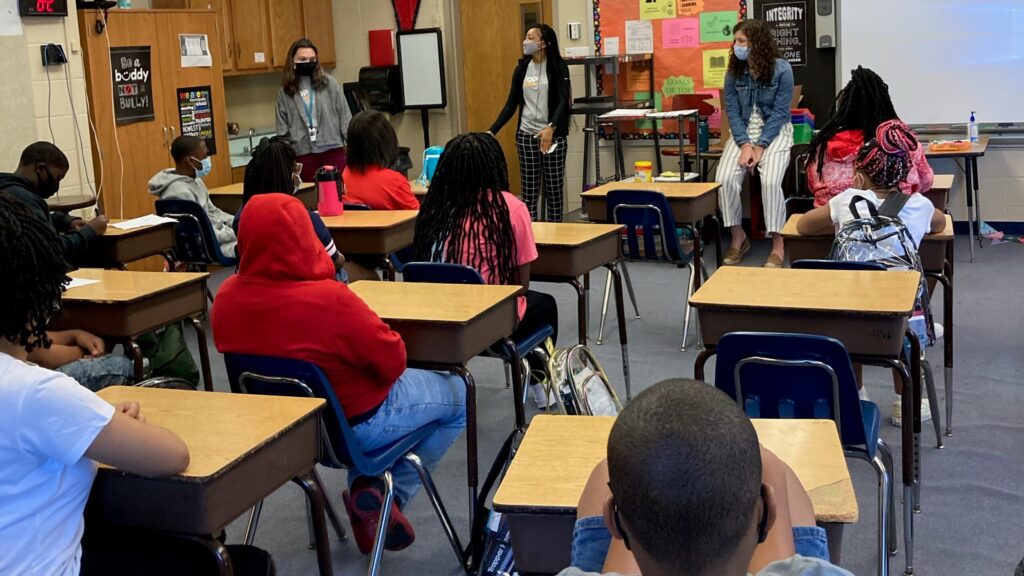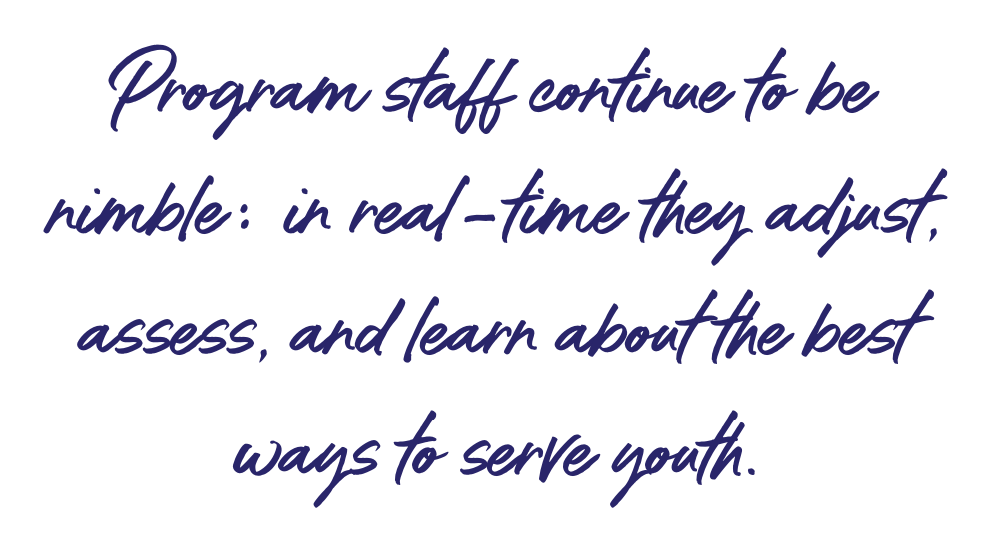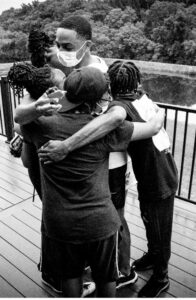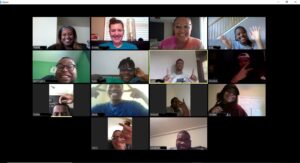In the first part of this series, Learning and Responding to Youth Needs: Wyman’s Commitment to Doing the Next Right Thing, we discuss how the last 18 months have been extremely difficult for Wyman teens and staff alike. We continued delivering on our mission to serve teens in the St. Louis area as the nation dealt with the “triple pandemic” – COVID-19, increased unemployment rates and economic uncertainty, and a heightened focus on the realities of systemic racism. We know these events have taken a devastating toll on the mental health and well-being of our nation’s youth (e.g., Flanagan et al., 2021), and that recovery and healing will be a slow process, with progress and setbacks along the way.
These challenges have also provided Wyman with a window of opportunity to reassess and more deeply understand youth needs and experiences. It also provides an opportunity to reflect on what we have learned and to determine how we will apply those lessons to better meet the needs of young people moving forward.
In the second part of this series, we will explore how we can apply the learnings of the last 18 months and think differently about our work in the future.
How might we think about our work differently moving forward?
We are still processing our pandemic learnings while we also continue to gather data from youth and staff on their experiences. As schools have returned to in-person instruction, with ever-shifting COVID-related restrictions and protocols, program staff continue to be nimble: in real-time they adjust, assess, and learn about the best ways to serve youth.
Overall, a great deal of what we’ve learned so far reaffirms the importance of Wyman’s foundational approach to serving youth through building strong 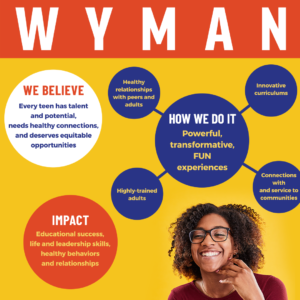 relationships with them, providing meaningful and engaging program experiences, and supporting their social and emotional learning. The importance that Wyman’s approach places on caring, responsive, and knowledgeable adults building relationships with young people to create engaging and empowering environments has continued to be an effective cornerstone of our work. We know these relationships are critical for buffering the impact of stress, and paving the way toward young people’s positive growth in their social and emotional skills, sense of self, and connections with others (Framework_for_ThrivingYouth_21320 (wymancenter.org)).
relationships with them, providing meaningful and engaging program experiences, and supporting their social and emotional learning. The importance that Wyman’s approach places on caring, responsive, and knowledgeable adults building relationships with young people to create engaging and empowering environments has continued to be an effective cornerstone of our work. We know these relationships are critical for buffering the impact of stress, and paving the way toward young people’s positive growth in their social and emotional skills, sense of self, and connections with others (Framework_for_ThrivingYouth_21320 (wymancenter.org)).
This leads us to re-commit to what is “tried, true, and tested” about our approach, AND calls us to evolve and make updates to our strategies where needed to ensure we are providing the most relevant support to the youth we serve. Updating program strategies may mean not continuing a particular activity that doesn’t seem to resonate with youth, like when staff made the decision to discontinue use of “asynchronous” program activities in the virtual space (activities designed for youth to complete at home on their own time) that did not generate much enthusiasm or engagement.
It also means leaning in to approaches that do receive favorable youth response, such as:
- Continued integration of technology tools like Kahoot, a game-based learning platform.

- Intentional use of humor as a strategy for connecting with youth, particularly in a virtual setting where youth engagement can be more challenging.
- Regularly hosting informal gatherings (“Lunch Bunch”) to create additional time to be present for youth and host a safe space for them to talk about how they are feeling and handling current circumstances.
Lastly, it means that we will continue to assess the strategies we use in our work with young people to ensure intentional focus on the skills and competencies that are most relevant to our youth during the current context.
Looking Ahead
We acknowledge that we are at the beginning of our journey to more fully incorporate the perspectives of our youth and our staff into our research and learning approaches, and we are committed to continuing this journey toward honoring the individual experiences of those who are closest to the work. Wyman’s programs don’t exist in a vacuum — it is critical to consider and incorporate context when making sense of data and describing impact. We are also at the beginning of the journey to fully process and utilize what we’ve learned so far in the strategies we employ with the young people we serve.
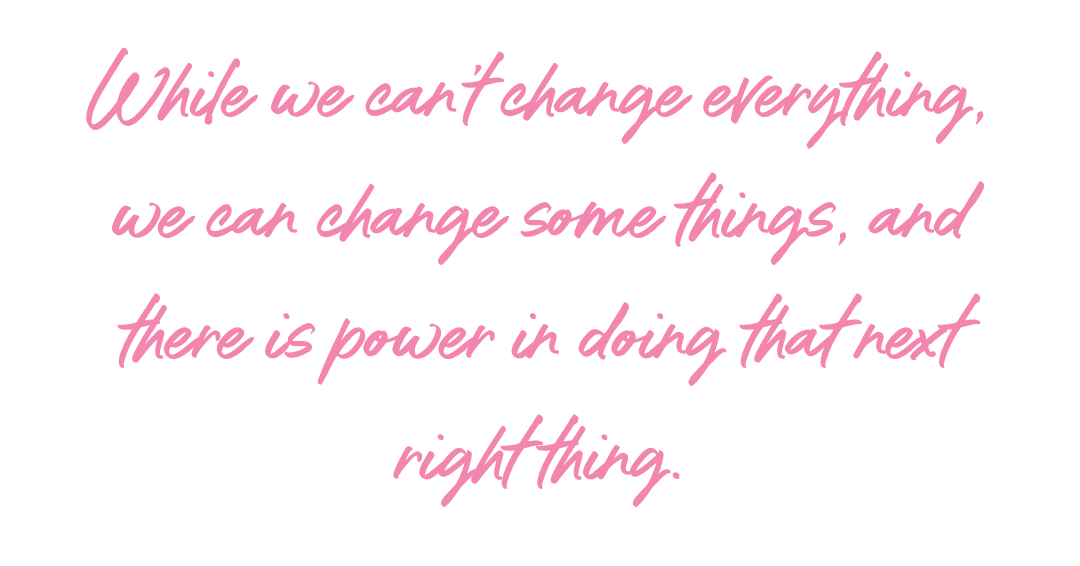 As we continue this journey, it’s important that we all take time to celebrate our successes in the face of adversity and find strength to keep moving forward. The challenges of these difficult times have reaffirmed that there are many changes we would like to see in our world to bring about a safer and more just society. While we can’t change everything, we can change some things, and there is power in doing that next right thing. We remain committed to doing just that.
As we continue this journey, it’s important that we all take time to celebrate our successes in the face of adversity and find strength to keep moving forward. The challenges of these difficult times have reaffirmed that there are many changes we would like to see in our world to bring about a safer and more just society. While we can’t change everything, we can change some things, and there is power in doing that next right thing. We remain committed to doing just that.
Blog post content is based on a panel presentation delivered by Sarah Nace, Director of Programs, and Grace Bramman, Associate Director of Evaluation & Grants, at Wyman’s 2021 National Network Coordinator Learning Exchange.


